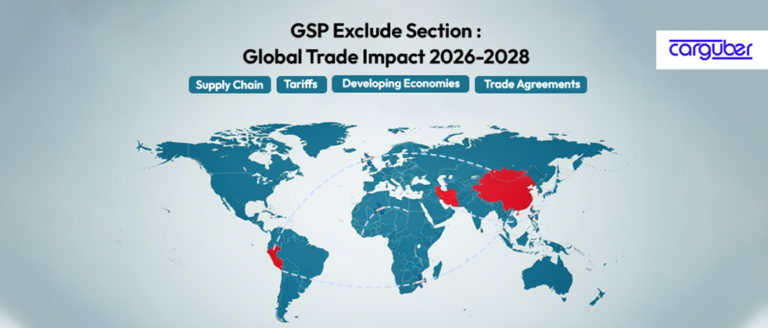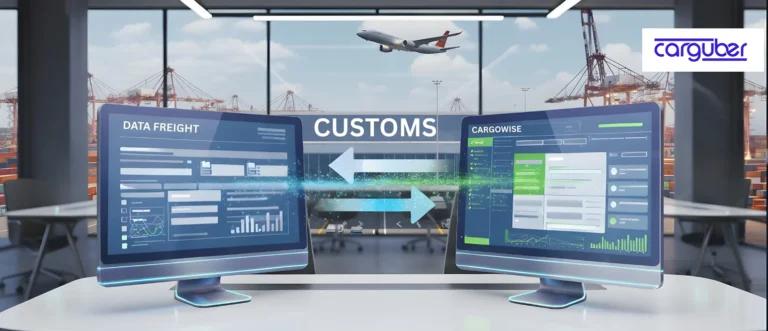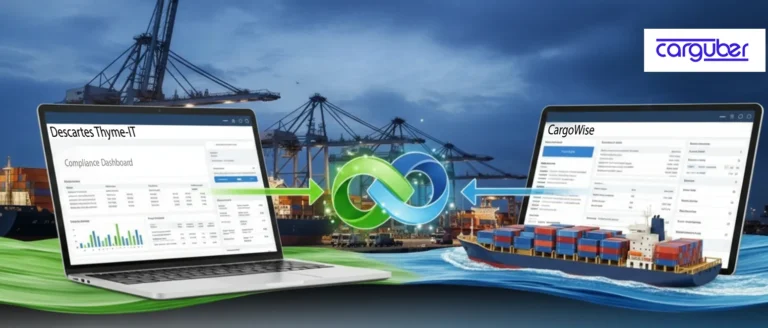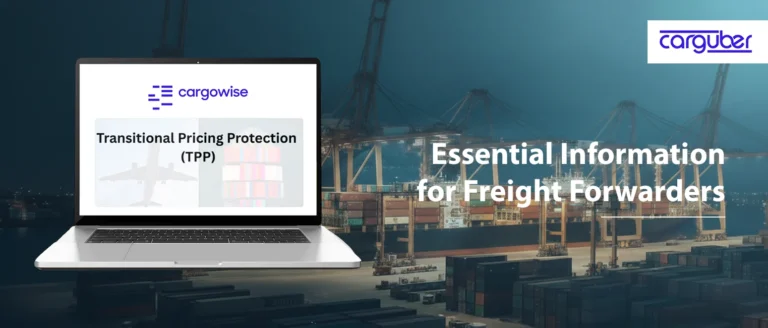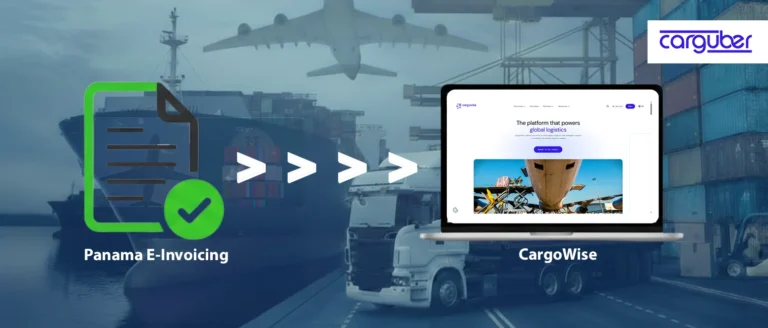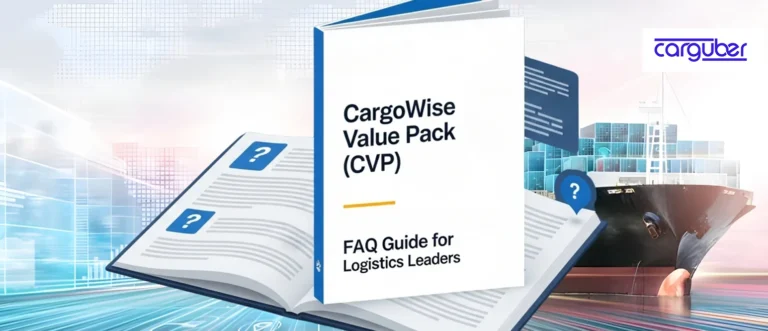How to Integrate Xero with CargoWise for Logistics Accounting?
It’s not easy to run logistics and supply chain operations. There’s already too much to do between organizing shipments, communicating with carriers, tracking invoicing, and keeping on top of compliance. When financial management is added, things can quickly become chaotic, particularly if your accounting and logistics systems aren’t communicating with one another.
That’s where integrating Xero with CargoWise is useful. Consider having real-time financial data directly connected to your logistical operations, automating laborious tasks, eliminating errors, and providing you with a comprehensive picture of your cash flow at all times.
What Are Xero and CargoWise?
Xero is a cloud-based accounting software designed for small and medium-sized businesses. It’s known for its easy-to-use interface, automated invoicing, payroll, and real-time financial reporting. It helps businesses track cash flow, reconcile bank transactions, and simplify tax compliance, all in one place.
CargoWise, on the other hand, is a cloud based ERP platform that simplifies freight forwarding, warehousing, customs clearance, and transportation tracking. It provides end-to-end supply chain visibility and automates logistics workflows, making operations more efficient and scalable.
Imagine merging these strengths, a smooth data flow that keeps your company operating efficiently is created by integrating Xero with CargoWise, which closes the gap between your financials and logistics.
How Does Integrating Xero with CargoWise Help?
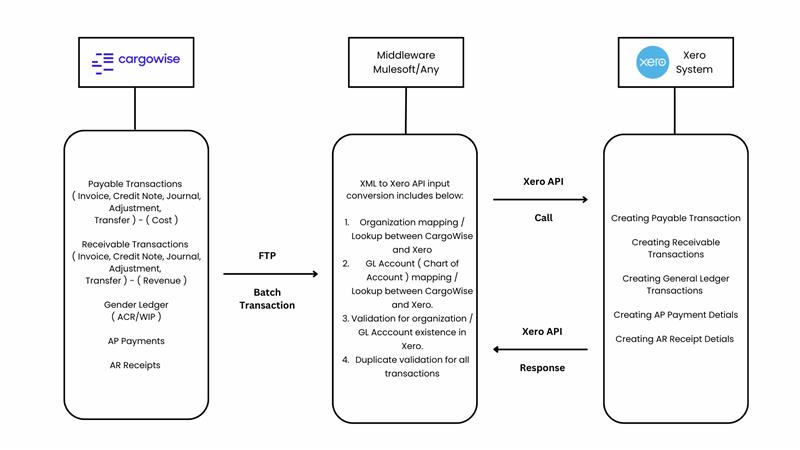
1. Get Rid of Manual Data Entry
If your team is still manually entering invoices, reconciling payments, or updating financial records, you’re wasting time and increasing the risk of errors. With this integration, financial data automatically syncs between Xero and CargoWise, eliminating the need for manual input and reducing mistakes.
2. Gain Real-Time Financial & Operational Visibility
Without real-time data, tracking cash flow, outstanding invoices, and financial performance becomes a guessing work. By integrating Xero with CargoWise, you get a single source of truth, where you can instantly see:
- Open and overdue invoices
- Shipment costs vs. revenue
- Profitability per shipment or client
3. Quicker Processing of Invoices Leads to Quicker Payments
Late invoices result in delayed cash flow, which can harm business operations. An integrated system expedites the payment cycle and enhances financial stability by automatically creating and sending invoices as soon as shipments are finished.
4. Better Supply Chain Cost Management
Fuel, carrier fees, warehouse fees, customs tariffs, and other expenses are associated with every shipment. Businesses are better able to track actual costs per shipment, profitability, and opportunities for optimization when all logistical expenses are directly connected to accounting.
5. Automate Tax & Compliance Reporting
Logistics companies operate in numerous regions, which means they must comply with a variety of tax laws and regulations. Integrating CargoWise with Xero automatically categorizes transactions, guaranteeing optimal taxation and audit preparation.
Challenges to Consider Before Integration
1. Technical Setup & API Integration
If CargoWise and Xero need to communicate properly, then it requires API integrations or third-party integration solutions. For smooth communication, businesses might need integration experts or consultants to help.
2. Data Consistency & Security
Syncing financial and logistics data requires accurate mapping to avoid discrepancies. Plus, with sensitive financial information being exchanged, strong security measures must be in place to prevent unauthorized access.
3. Cost vs. ROI
Integrations involve costs, whether it’s hiring a developer, using middleware, or paying for integration services. Nonetheless, a high return on investment (ROI) is frequently the consequence of the time saved, the errors decreased, and the enhanced cash flow.
Best Practices for a Successful Integration
Integrating Xero with CargoWise can revolutionize financial operations, and Carguber ensures a smooth and error-free implementation. To maximize the benefits, businesses must first define their goals, whether solving manual invoicing issues, reducing payment delays, or improving financial visibility. Carguber’s CargoWise support helps the integration to align with your needs, ensuring automated invoicing, expense tracking, and tax reporting work flawlessly.
There are multiple ways to integrate Xero with CargoWise, and Carguber selects the best approach for your business. Whether using native integrations, third-party middleware, or custom API development, we ensure seamless data flow and system compatibility. Before full deployment, Carguber rigorously tests the integration, identifying potential errors and fixing mismatches before going live, guaranteeing accuracy and efficiency.
We provide hands-on guidance on accessing reports, managing data syncs, and handling exceptions. Even after implementation, Carguber continuously monitors the integration, optimizing performance and eliminating inefficiencies to maximize productivity and financial accuracy.
Conclusion
Integrating Xero with CargoWise can be the answer your logistics company needs if it is having trouble with manual invoicing, late payments, or mismatched financial data.
The system helps logistics organizations save time, cut expenses, and scale effectively by automating financial procedures, increasing accuracy, and offering real-time information.
Are you ready to simplify your logistical accounting? Contact us today to find out how we can help you integrate Xero with CargoWise and take your operations to the future!


